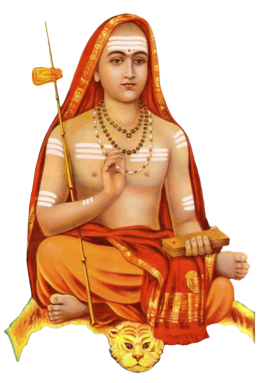स्वरूपमानन्दघनं विचार्य ।
विधूय मोहं स्वमनःप्रकल्पितं
मुक्तः कृतार्थो भवतु प्रबुद्धः ॥ ४७२ ॥
svarūpamānandaghanaṃ vicārya |
vidhūya mohaṃ svamanaḥprakalpitaṃ
muktaḥ kṛtārtho bhavatu prabuddhaḥ || 472 ||
Undiluted—unmixed, i. e. absolute.
Illumined—lit. awakened, i. e. from this unreal dream of duality.
पश्यात्मतत्त्वं स्फुटबोधचक्षुषा ।
निःसंशयं सम्यगवेक्षितश्चेच्
छ्रुतः पदार्थो न पुनर्विकल्प्यते ॥ ४७३ ॥
paśyātmatattvaṃ sphuṭabodhacakṣuṣā |
niḥsaṃśayaṃ samyagavekṣitaścec
chrutaḥ padārtho na punarvikalpyate || 473 ||
Scriptural words—such as “Thou art That,” and so on.
Discerned—realised in Samadhi.
सत्यज्ञानानन्दरूपात्मलब्धौ ।
शास्त्रं युक्तिर्देशिकोक्तिः प्रमाणं
चान्तःसिद्धा स्वानुभूतिः प्रमाणम् ॥ ४७४ ॥
satyajñānānandarūpātmalabdhau |
śāstraṃ yuktirdeśikoktiḥ pramāṇaṃ
cāntaḥsiddhā svānubhūtiḥ pramāṇam || 474 ||
Scriptures—which tell of one’s eternal identity with Brahman, and declare all duality to be unreal.
Reasoning—upon those scriptural statements so as to be convinced of their truth. For instance, one can argue that bondage being a creation of one’s mind must be unreal and that Knowledge of Brahman dispels it, and so on.
Words……Guru: The Guru is a man of Realisation and perfectly unselfish and all-loving. He is therefore an Apta, and as such his words are authority.
One’s own experience .: This is the ultimate test. For otherwise one is not perfectly satisfied.
Concentrating .—in Samadhi.
स्वेनैव वेद्या यज्ज्ञानं परेषामानुमानिकम् ॥ ४७५ ॥
svenaiva vedyā yajjñānaṃ pareṣāmānumānikam || 475 ||
प्रज्ञयैव तरेद्विद्वानीश्वरानुगृहीतया ॥ ४७६ ॥
prajñayaiva taredvidvānīśvarānugṛhītayā || 476 ||
संसिद्धः संमुखं तिष्ठेन्निर्विकल्पात्मनात्मनि ॥ ४७७ ॥
saṃsiddhaḥ saṃmukhaṃ tiṣṭhennirvikalpātmanātmani || 477 ||
ब्रह्मैव जीवः सकलं जगच्च ।
अखण्डरूपस्थितिरेव मोक्षो
ब्रह्माद्वितीये श्रुतयः प्रमाणम् ॥ ४७८ ॥
brahmaiva jīvaḥ sakalaṃ jagacca |
akhaṇḍarūpasthitireva mokṣo
brahmādvitīye śrutayaḥ pramāṇam || 478 ||
The teacher’s address begun in Sloka 213 ends here.
परमवगम्य सतत्त्वमात्मयुक्त्या ।
प्रशमितकरणः समाहितात्मा
क्वचिदचलाकृतिरात्मनिष्ठतोऽभूत् ॥ ४७९ ॥
paramavagamya satattvamātmayuktyā |
praśamitakaraṇaḥ samāhitātmā
kvacidacalākṛtirātmaniṣṭhato’bhūt || 479 ||
Vivekachudamani – Introduction
1: Devoted Dedication
2: Glory of Spiritual Life
3: Unique Graces in Life
4-7: Miseries of The Unspiritual Man
8-13: Means of Wisdom
14-17: The Fit Student
18-30: The Four Qualifications
31: Bhakti – Firm and Deep
32-40: Courtesy of Approach and Questioning
41-47: Loving Advice of the Guru
48-49: Questions of the Disciple
50: Intelligent Disciple – Appreciated
51-55: Glory of Self-Effort
56-61: Knowledge of the Self-Its Beauty
62-66: Direct Experience – Liberation
67-71: Discussion on Questions Raised
72-75: Gross Body
76-82: Sense Objects a Trap – Man Bound
83-86: Fascination for Body Criticised
87-91: Gross Body Condemned
92: Organs of Perception and Action
93-94: Inner Instruments
95: The Five Pranas
96-101: Subtle Body – Effects
102: Functions of Prāna
103-105: Ego Discussed
106-107: Infinite Love – the Self
108-110: Māyā – Pointed Out
111-112: Rajoguņa – Nature and Effects
113-116: Tamoguņa – Nature and Effects
117-119: Sattvaguņa – Nature and Effects
120-121: The Causal Body – Its Nature
122-123: Not-Self – Description
124-135: The Self – Its Nature
136: Advice for Self-control
137-142: What is Bondage – The Reply
143-144: The Powers – Agitation and Veiling
145-146: Bondage in Action
147-153: Ātman and Anātman – Discrimination
Negation of the Kośas
154-164: – Annamaya kośa (Food sheath)
165-166: – Prņamaya kośa (Vital air sheath)
167-183: – Manomaya kosa (Mental sheath)
184-188: – Vijnanamaya kośa (Intellectual sheath)
189-191: Ātman – Unattached
192-193: What is Liberation? – Disciple
194-206: Self-Knowledge gives Liberation
207-210: Anandamaya kośa (Bliss sheath)
211: Ātman – Other than the Five Kośas
212: What is Ātman? – Disciple
213-225: Nature of the Self – Discussion
226-236: All Manifestation Absolute
237-240: Brahman – Its Nature
241-249: That Thou Art – Explanation
250-253: Attitude in Meditation
254-266: Aids to Meditation
267-276: Give up Vāsanās – the Method
277-292: End Superimposition – The Means
293-297: The Perceived I’ Factor – False
298-309: Condemnation of the Ego
310-319: Actions, Thoughts and Vāsanās – Renounce
320-329: Total Vigilance – Its Price
330-338: In the One, No Plurality
339-348: Spiritual Growth – the Secret
349-353: Cause-Effect – False
354-372: Samadhi – Its Nature
373-378: Fully Detached – Samadhi Easy
379-383: Meditation – the Technique
384-397: Continuous Attention to Self
398-406: No Diversity in Reality
407-413: Ātma-vicāra – Contemplation
414-418: Give up Perceptions
419-425: The Science of Reality – Its Benefits
426-445: Signs of a Realised Seer
446-464: Prārabdha for a Saint
465-471: There is No Plurality
472-479: Experience of Selfhood
480-520: Practice of Knowledge – Disciple
521-575: Final Words of Advice
576-578: Blessed Disciple Liberated
579-581: The Glory of the Textbook

Vivekachudamani – Verses 472-479 – Vivekachudamani Verses 472-479 – By Adi Sankaracharya – In Sanskrit with English Meaning, Transliteration, Translation, Commenary, Lyrics, Audio – Vivekachudamani-472-479
